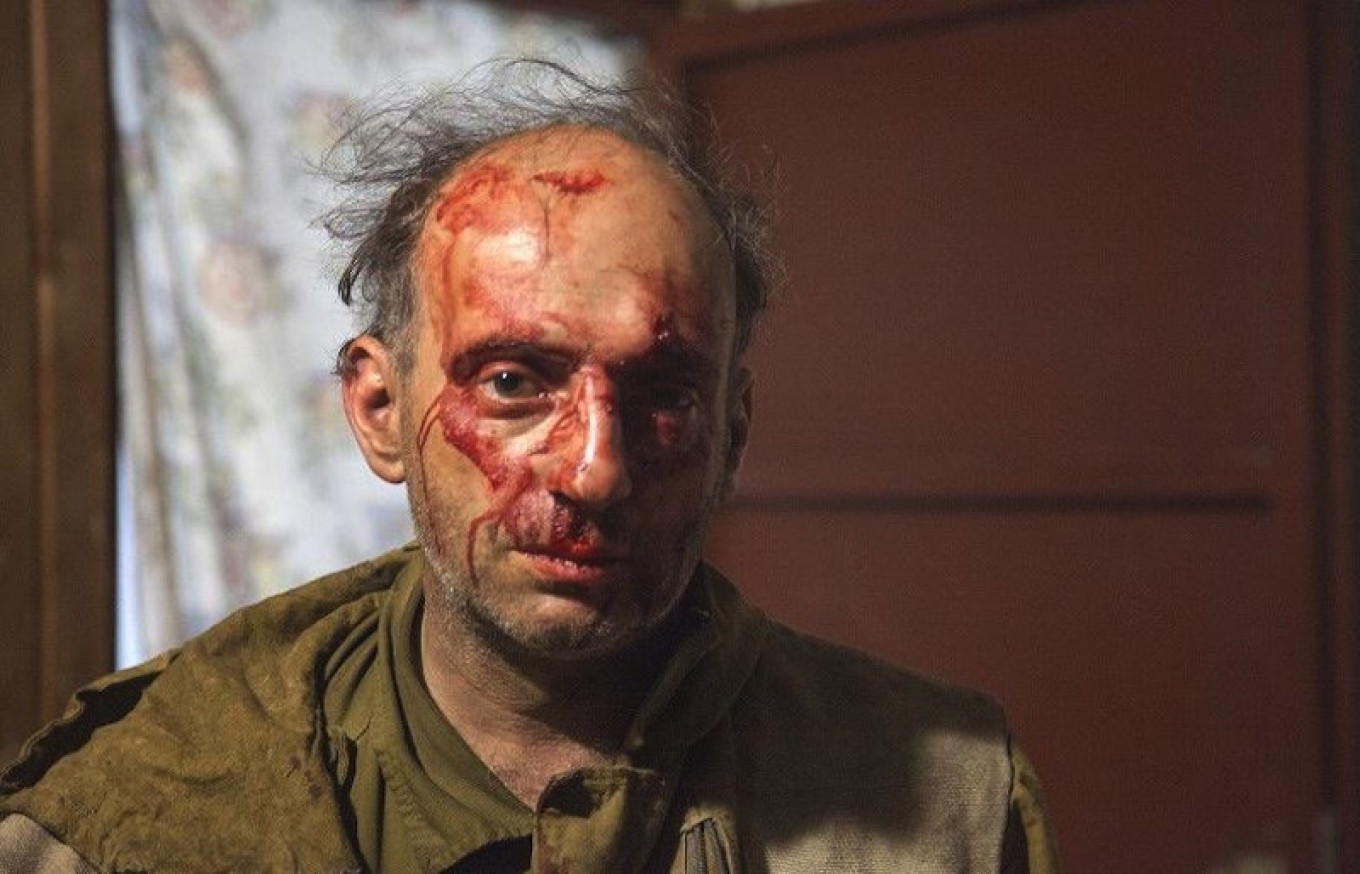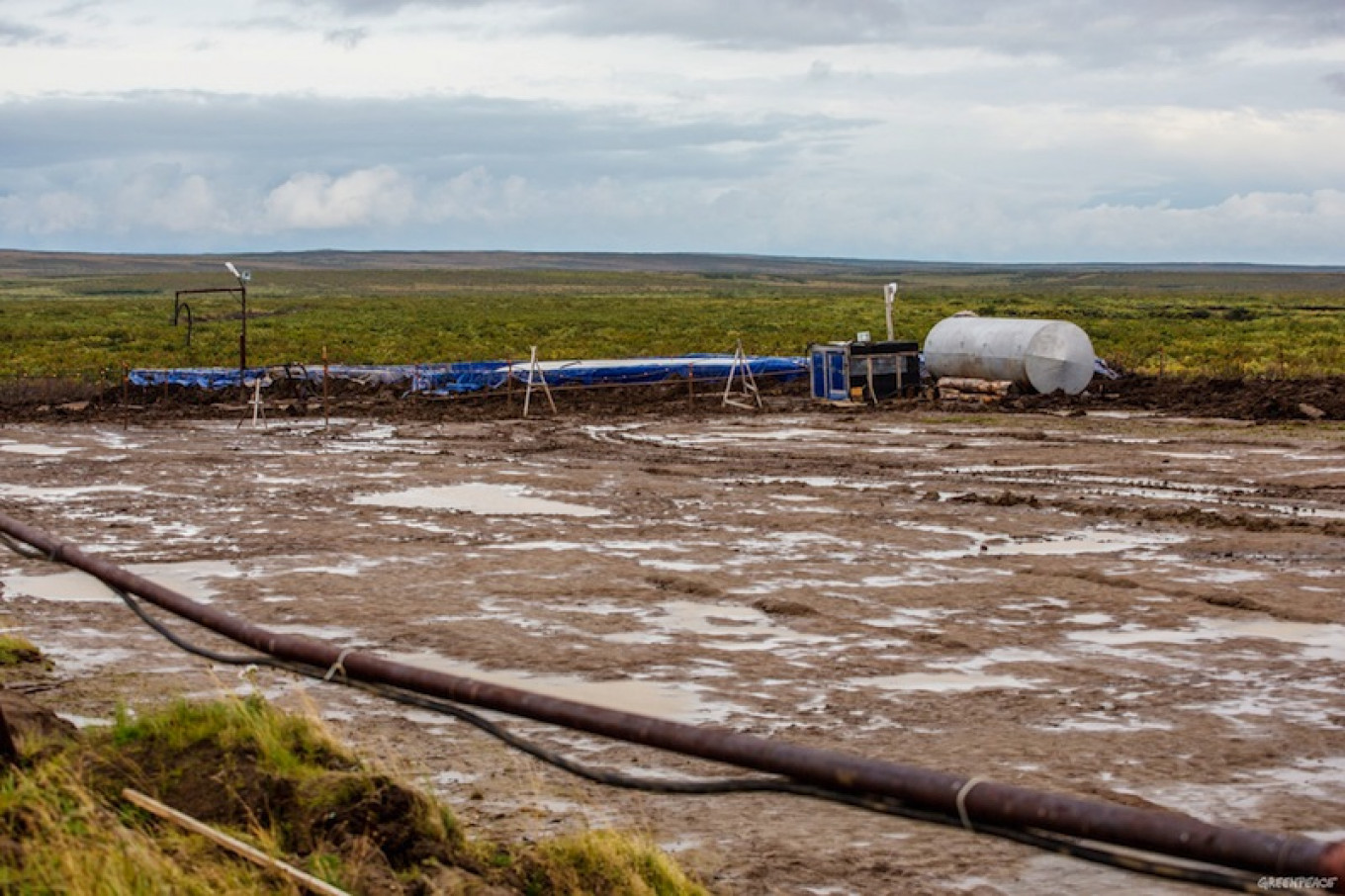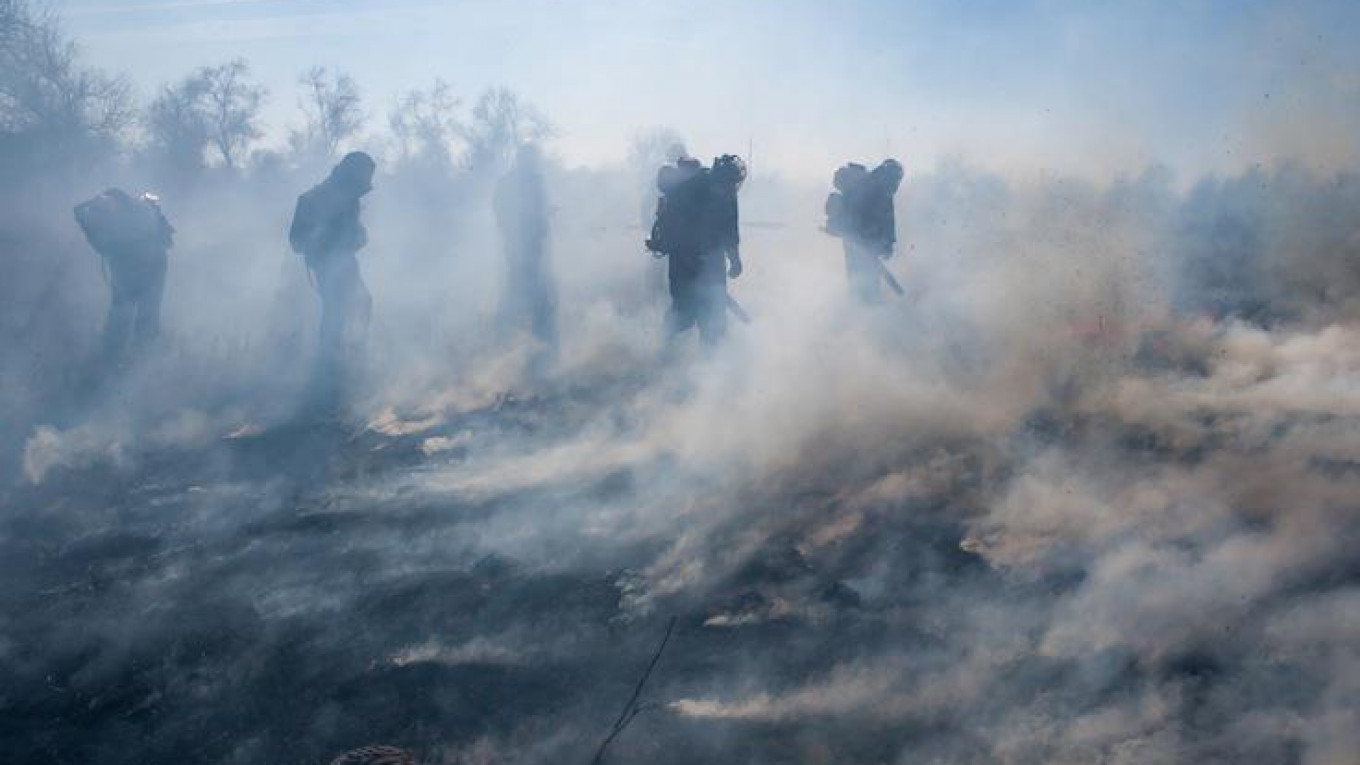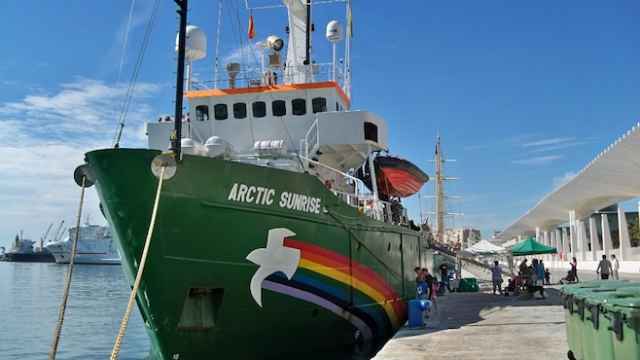The attackers came at night. Eight strong men in masks scaled the fence surrounding the camp where a group of Greenpeace activists were staying. They started slashing tents with knives, beating ecologists with rubber batons, and shouting: “Get the hell out of here! Go back to your America!”
Risking their own safety, volunteers on lookout duty managed to warn those sleeping. “When I woke up to the sound of a horn,” Grigory Kuksin, the group’s leader, wrote on Facebook the day after the attack, “and saw my friends being brutally beaten, [...] I was sure that I had brought my friends to die.” The attackers ran through the camp carrying guns and knives, slashing open tents.
“When they threw me on the ground and pointed a gun at me, I felt a sort of relief, waiting for them to shoot,” Kuksin wrote. “They fired the shot into the ground instead — right near my head.”
Nobody was killed that night. Having caused enough damage — slashing tires, destroying equipment, and breaking the bones of two Greenpeace activists — the attackers abandoned the camp, leaving a graffitied phrase on the gates: “Pindosy live here” (a derogatory Russian word for Americans).
The attack took place on the night of Sept. 9 in Russia’s southern Krasnodar region, where 19 volunteers had arrived to help fight the fires spreading around a local river. “Before the trip, we notified everyone in the region: the governor’s office, the police, the emergency services, and even local municipal authorities, who actually welcomed our help,” Kuksin told The Moscow Times.
The group was supposed to tackle fires that regular emergency workers couldn’t access, and Greenpeace says their trip had nothing whatsoever to do with politics.
However, even something as simple as helping put out wildfires is enough to provoke conflict.
In the past month, Kuksin’s firefighting squad isn’t the only Greenpeace group to encounter resistance from locals. In August, at least two other expeditions (to the Taimyr and Yamal peninsulas in Russia’s far north) confronted sabotage, intimidation, and constant attention from the police. “We haven’t seen anything like this in years,” Maria Favorskaya, the spokesperson for Greenpeace Russia, told The Moscow Times.
Playing With Fire
Kuksin’s expedition to the Krasnodar region got off to a bad start. The man in charge of their first campsite forced them off the grounds in the middle of the night. He said there were people who wanted Greenpeace to leave at once, though he wouldn’t specify who.
The activists moved to a different site, and almost immediately a group of Cossacks showed up, demanding that Greenpeace leave, once again. By this point, the volunteers were exhausted, and local police had only added to their troubles with constant inspections. Then came the attackers armed with guns and blades.
“In the 16 years that I’ve been fighting fires in different Russian regions, I’ve never had to face such a distinct resistance from people who live in the area and would, in theory, benefit from someone helping them deal with burning fields,” says Kuksin.
The Krasnodar branch of the Rossiya television network — part of the state-run VGTRK television holding company — aired a report on Sept. 12, accusing the volunteer firefighters of starting the very fires they came to extinguish. The channel also claimed that Greenpeace was acting in the interests of the U.S. government. Later in the day, the story aired again — this time in a national broadcast.
“This is all very sad. They are accusing us of being U.S. agents, but we didn’t have a single foreigner in the group,” says Kuksin. “We had the best available volunteers from regions across Russia who came here to help their Krasnodar friends manage the fires.”
On Sept. 14, the Justice Ministry declared Ecology Watchdog of the North Caucasus, a local environmental NGO that invited Greenpeace firefighters to the Krasnodar region, “foreign agents.” The label implies additional scrutiny from the government and is handed to NGOs that receive foreign funding and are engaged in vaguely defined “political activity.”

Sabotage in the North
In August, another group of Greenpeace ecologists traveled to the Taimyr Peninsula, accepting an invitation from a local association of indigenous peoples who are concerned about the Independent Oil Company (IOC) preparing to build an oil loading terminal near one of the villages.
“When we traveled there in April, we saw that the IOC was storing oil products in plastic containers too close to the Yenisei River’s coastline, which is dangerous,” recalls Konstantin Fomin, the Greenpeace spokesperson who went on the trip. The activists complained about the containers to the Prosecutor’s Office, and the indigenous group invited Greenpeace back later in the month. “They claimed we would see other violations,” Fomin told The Moscow Times. “So we went again in August to record these violations and see if anything had been done about the containers.”
Some parts of the peninsula were only accessible by boat, so the group brought two inflatable boats with them, only to discover that the engine on one of them was damaged: the fuel hose was stuffed with fabric, and cords had been cut. Activists say they inspected the boats in Moscow, prior to the trip, and everything was fine; the damage had been deliberate and occurred after they arrived, Greenpeace says.
Nevertheless, the group traveled around the peninsula and photographed violations of environmental regulations. In one of the villages — abandoned by locals and now populated entirely by oil-company workers — the activists came across tracks made by caterpillar vehicles that, according to Fomin, are forbidden in the area. According to photographic evidence by Greenpeace, the vehicles also threatened a nearby ancient graveyard.
All this time, Fomin says, men hired by the oil company followed the activists, filming them with hidden cameras. This footage appears to be what later aired on television, presented as if Greenpeace raided and photographed the graveyard out of disrespect for local beliefs. The broadcast featured an interview with Gennady Schukin, president of the local association of indigenous peoples, who complained about the Greenpeace group. He also filed a formal report with the Taimyr district Prosecutor’s Office and the police.
In comments to The Moscow Times, Schukin confirmed that photographing the graveyard and publishing pictures in the media is disrespectful, according to local traditions. Alexander Chernykh, a journalist for the Kommersant newspaper who went to Taimyr with the Greenpeace group, disagreed.
“After I returned from the trip, I started reading about local indigenous peoples and their traditions,” Chernykh told The Moscow Times. “Nothing suggests that people are not allowed to visit those graveyards or photograph them. During the outbreak of anthrax in the Yamal region, there were plenty of photos and videos of similar graveyards. State-owned television channels, I’m sure, aired those videos, too, and no one seemed insulted by that.”
The Independent Oil Company didn’t respond to The Moscow Times request for comments.

Witness Intimidation
Vladimir Chuprov, a Greenpeace ecologist and the leader of the group that went to the Yamal Peninsula in August, says the main obstacle volunteers face is that people interested in talking to Greenpeace about local problems are constantly pressured against doing so. “Everyone — and I mean everyone — who was ready to meet with us and talk refused to do it when we actually arrived. They said they had received calls telling them not to get involved,” Chuprov told The Moscow Times.
Chuprov’s group went to Yamal to monitor climate changes that might have led to the anthrax outbreak earlier this summer. From the moment they arrived, the ecologist says, law enforcement officers barely disguised that they were following them. Law enforcement even visited the activists at their hotel to perform a surprise document check.
More importantly, however, police detained the veterinarian who was the first to report the anthrax epidemic. “They arrested him at the gates to our hotel. He was on his way to meet us. No one has heard anything from him since,” Chuprov says. “We also heard that another two reindeer herders who wanted to talk to us were detained, but we couldn’t verify this information.”
Finally, Chuprov’s ticket for a helicopter trip to one of the towns in Yamal was canceled right before the flight was scheduled to take off.
No explanation was given for the cancellation, and the helicopter left without him. “We have never dealt with resistance of such magnitude,” he says. “Even during the wild 1990s, we somehow managed to negotiate with different forces that didn’t want us to do what we do. But now it’s something completely different.”
Local police did not respond to a request from The Moscow Times to confirm the arrest of the veterinarian.
Spokespeople of the Yamal district administration told The Moscow Times they didn’t know anything about the arrest or surveillance, but said the administration provided all possible support to the group.
Why and What Next
Activists and experts explain the sudden crackdown on environmental activists differently.
A recent report by the Kommersant newspaper suggests that volunteer firefighters in Krasnodar might have made an enemy of a local fish farm that apparently cuts corners when it comes to responsible environmental policy. The farm allegedly trims tall grass in floodplains by setting fire to the grass, instead of using more expensive and complicated technology. The farm’s owner, Igor Dzheus, is involved in a longstanding feud with the local ecologists who initially invited Greenpeace, Kommersant says.
In the north, local law enforcement proactively sabotaged Greenpeace’s initiative, in order to please the oil companies, according to Kommersant’s Alexander Chernykh. “Oil companies in these regions mean jobs for people,” Chernykh told The Moscow Times. “Even more so for active-duty local law enforcement officers. They know that — upon retirement — they can easily find work at an oil company. They wouldn’t do anything that could hurt their future employers.”
Khalimat Tekeyeva, the spokesperson for Greenpeace Russia, says the recent incidents involving the organization probably aren’t connected. “We are talking about three different regions very far from one another,” she says. “But for some reason, the local authorities in all three of these places were apparently afraid that we would see something we aren’t supposed to see, and so they decided to deal with it in their own, sometimes illegal, ways.”
The problem is much bigger, says Sergei Simak, chair of the board of the Russia’s Green League NGO, arguing that local authorities are trying to stifle activists wherever possible, in order to “sterilize” Russian society and eliminate any independent public activity. “It just happens faster in some regions than in others,” Simak told The Moscow Times. The crackdown comes easier in the places “used to totalitarian rule,” like the Krasnodar region, he says.






